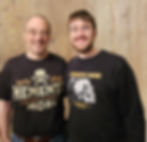Brent Robbins: On Relationships and Dying
- C Johnston
- Jun 11, 2025
- 10 min read

Brent Robbins doesn’t hesitate when he’s asked to describe himself.
“I’m a man of God. A husband. A father. A son. Teacher and scholar.”
To be who he is, Brent explains, he can’t be by himself. He needs others.
“I can’t be a man of God without my creator. I can’t be a husband without my wife. Obviously, I need my children, parents, students and fellow scholars to be who I am. My whole existence is dependent upon others to fulfill my vocation and mission.”
He explains that there’s also a hierarchy to the relationships … God, wife, children, and so on. “I try to keep that hierarchy in mind as I make decisions about my life. God comes first and everything falls into place. I need to keep my priorities in order.”
Brent, Professor of Psychology and Director of the Doctor of Psychology Program at Point Park University in Pittsburgh, has a lot of details to keep in order these days.
In October of 2024, Brent was diagnosed with stage four pancreatic cancer. While the median survival rate for someone with stage four pancreatic cancer is two to six months, most people live for about one to two years. The five-year survival rate is a very low one to three percent.
Brent, the realist, knows a cure for his cancer is unlikely. Brent, the man of faith, knows that His heavenly Father is a God of miracles. “How do I balance the hope that God can heal me with the acceptance that it may be God’s plan for me to die of this cancer?”
His pastor helped him think through this question, leaving Brent to consider the approach of Jesus in the Garden of Gethsemane.
“Jesus asked that the cup be taken from him – but that the Father’s will, not his own, be done. That was my answer. I pray that I can be spared. But if that’s not God’s will, then I ask that my passing from this earth be full of grace.”
Suffering and dying are key areas of Brent’s academic expertise. He’s conducted a lot of research, written many scholarly papers and even a book on the topic. His book, “The Medicalized Body and Anesthetic Culture: The Cadaver, the Memorial Body and the Recovery of Lived Experience” was published in 2018.
Medicine today, he says, treats death as the end of the functioning of the body, not as a loss of possibilities. He stresses that it’s important to remember our ancestors who have passed, honor them and remember their contributions. Life should be treated with respect, even when it has ended on earth.
The ancient Roman call to Memento Mori encourages the appreciation of life and the gift of each day. It means, literally, “Remember You Will Die.” Brent points out that realizing the reality of our mortality puts every day and every moment into context.
“Our culture tells us to be self-sufficient, self-determined and autonomous. As a man of God I know that I am not capable of doing anything on my own. So I contemplate my own mortality. Because God became flesh, died and rose again so that we can live eternally, I will go through death to receive immortality.”
While living in St. Louis many years ago, Brent had an epiphany that led him into his field of psychology. At the time, he had graduated with a degree in film making but wasn’t working in the field. A failed romance and engagement left him alone, depressed and with no sense of motivation or purpose.
When he decided to see a movie one day, the only one starting as he arrived at the theater was Groundhog Day. With a laugh he says, “I wanted something that was deep and depressing. Instead, I thought I would be watching a frivolous comedy.” But the movie, with a surprising spiritual depth, moved him.
He saw himself in Bill Murray’s character.
“I was self-absorbed, all about myself. Not to the same degree, but I realized that I was all about me, me, me. No wonder my relationship didn’t work out and my life felt empty.”
In the film, Brent watched Bill Murray’s character go through a process. He woke up each day with all the variables being the same. So he experimented with what would make him happy. Hedonism, womanizing and other ways to satisfy himself left him empty. And while he was attracted to the female colleague who had the virtue he lacked, she saw through his self-centeredness. Even suicide eluded him. But when he started to see the needs of other people and helping them, he found satisfaction. And he studied music and literature to enrich his life. He was making the most of the gift of time he was given.
Murray’s character became a better person when he stopped being self-centered. And people genuinely liked him. He was worthy of love. The woman he admired began to pursue him – and of course they lived happily ever after.
Greatly impacted by the movie, Brent drove home and knew he needed to stop being self-absorbed and start making the most of each day. He decided to go into psychology, which was a fascination of his, as a way to help people. He laughingly says that he lived like a monk, voraciously reading and absorbing everything he could about psychology. He was preparing for grad school.
“I decided I didn’t want to pursue women, which kind of mirrored Groundhog Day. As I pursued who I wanted to be, with the goal of helping others, I had all this energy behind me. I had a confidence and exuberance for life. That’s when I met April, who is my wife now. And she pursued me.”
April remembers what attracted her to Brent. “He’s intellectually brilliant. He knows all about music, film and art. He is the coolest person I know.”

They fell in love, married and then moved to Pittsburgh, where Brent got his masters of arts and then doctorate in psychology at Duquesne University.
He talks about his spiritual struggles before knowing April.
“When I was young, my parents divorced. I grappled over why we have to suffer. My father left and was very happy. My mother was miserable. She used me as a source of support.”
Brent continues, “I would read the Bible, finding scripture that would literally light up on the page. I knew that my mother needed to hear these passages, so I wrote them down and gave them to her. We recently moved her into assisted living, and we found all of those passages. She says they had a great impact on her.”
When he was reading scripture, he thought a lot about Job, who was a righteous man. Brent couldn’t understand why God let the devil cause pain in Job’s life. Brent couldn’t reconcile a loving, all-powerful God with all the suffering he allows. He lost his faith in God because of it. He calls that his time of quest, searching and studying world religions to find an answer.
He says that fell into a sort of new-age philosophy – thinking that maybe there was a God but He wasn’t engaged in our lives. That changed when April converted to Catholicism and brought Brent back to the church. He was resistant at first, but says he was drawn in. He renewed a relationship with his heavenly Father.
The couple was living in Buffalo when Brent was at the culmination of a retreat where he was supposed to be silent and pray for three hours.
“Be still and know that I am god!” – Psalm 46:10
“It was a mystical experience with God speaking to me,” explains Brent. “I knew it was Him and I was incredulous. It was not at all like I was talking to myself.”
“One of the things God said was, ‘You’re going back to Pittsburgh.’ And I said I couldn’t. I had tried, but there were no jobs for me in Pittsburgh. I was four years into a tenured position. My wife was happy and had a good group of friends. I couldn’t see that it was something that could happen. I was arguing with God! But He wasn’t saying, ‘I want you to do this.’ It was prophetic, ‘This will happen.’”

Brent says that it seemed like the whole earth shifted within a year to make returning to Pittsburgh a reality. He ended up having three different job offers in Pittsburgh, which rarely happens in academia. It was powerful and validating for him.
That’s why he had a sense of mission when he came back to Pittsburgh. He knew he was where he was supposed to be. He loved his position at Point Park University and was soon forging a new road. He created a doctoral program–an incredibly arduous undertaking. He was driven, he knows, and led the faculty through a rigorous accreditation process, earning full approval. The program is now training psychologists who will be impacting their patients for decades to come.
In Pittsburgh, he also experienced the suffering and death of his father, Jack, to whom he was very close.

“Throughout my life, my father made me feel safe, secure and loved. He was my biggest fan and ally.”
When his father was very sick and in the hospital, he was no longer able to eat. He had a feeding tube, which was a temporary measure. The medical team needed a decision. Were they to remove the feeding tube from his throat, resulting in starvation? Or put a feeding tube directly into his stomach, sustaining a painful life? It was up to Brent, the only son, who had power of attorney.
After talking to his pastor, Brent realized that the Catholic church recognized a feeding tube as an ordinary, not extraordinary, measure to sustain life. It was the right thing to do to have the feeding tube inserted, he decided. His father was Catholic and wanted to follow Catholic beliefs.
The social workers talked to him about a nursing home, but Jack’s estranged wife Kelli wanted to take him home and care for him. That’s exactly what she did. He lived for six months – a time that Brent says is a gift and a blessing.
Brent and his family reconnected with his stepmother Kelli, who is again part of the family.
“Kelli was taking care of him, and hospice nurses came and went. Dad was so happy during that time when she was there to take care of him and I would visit.”
Brent spent a lot of time with his father, talking and praying. He sang and played the guitar for him, and read him his favorite poems and books. They celebrated birthdays, Christmas, Easter and other special times.
At a certain point Jack could no longer digest the food from the tube, so it was removed. When Brent received word that his dad was nearing death, Brent hurried to him. He remembers walking in and saying, “Well, Dad, you always loved to travel. You’re going on one heck of a trip now!”
Brent remembers sharing memories and letting him know he was a good father. “I told him a couple of times, ‘Dad, it’s time for you to go. I’m going to be ok. I’ll miss you and will always remember you.’ We put on Gregorian chants, which he loved. And he went to sleep and quietly passed.”
“My dad had a beautiful death.”
Brent’ says that his dad’s final days and his passing exemplify the dignity of the person – which is not how culture says we should evaluate the worth of a person. Society asks, are they autonomous and self-determining? Are they feeling good as opposed to suffering? Are they a person of status and achievements?
Brent disagrees. “My study of scripture – and the beatitudes in particular – tells me that those are all the wrong things to evaluate someone on. We are indigent and dependent on God. Poverty of spirit is the recognition of our need for God. If status and glory are what motivates us, we would be miserable because we would have to have to sacrifice truth, beauty and goodness to the crowd. That never satisfies. We need to be willing to be sacrificed for righteousness’ sake.”
He refers to the issue of whether or not to implant his dad’s feeding tube. Some people thought his dad’s life wasn’t going to be worthwhile anymore because he would be dependent. And he would suffer. While those people believe they’re being merciful, Brent sees that God has a plan through it all.
“My experience on suffering is different. And now that I have stage four cancer, I guess I have a lot of credibility on the subject!” he says with a laugh.
And he has much to say. “Nobody who God selected to be his missionary was saved from suffering. He’s not being cruel – and that’s what I struggled with as a young person. It’s redemptive. It builds character. Suffering is like a purifying fire. If you’re righteous you come out better from it. If you’re unrighteous, if you’re corrupt, it destroys you.”
Brent’s bloodwork during his chemotherapy shows a great shrinking of the cancer. And he’s been able to tolerate the chemotherapy well. The possibility exists that he could be the one to defeat the odds of the disease.
Every day of his life Brent thinks about what he wants to accomplish. His chemotherapy puts him at high risk of stroke, cardiac arrest, and low blood counts that put stress on his kidneys. He knows his health is precarious all the time, even as the cancer is shrinking. So he tries to live every day as if it’s his last.
God is priority in everything he does.
And his next priority is April. He realizes that she is the one who struggles the most. “In the time that I have left I’m trying to prepare her spiritually and psychologically for the time when I’m gone. And we’re doing a lot of work on that, with couple’s therapy and prayer.”
The two are closer than ever. April says, “Romance was always good for us. But now it’s on fire!”

Next he puts value on the time and quality of time he spends with his kids and family members. This past year his older son Dean, who’s 22, married Isabel. His younger son, Dominic, is 15 years old. There’s more life to be lived, loved and enjoyed as a family, so that’s what they’re doing. They all talk about anything and everything. And live as a close-knit family.
He’s had to cut back the overtime at work, but he remains highly dedicated to his students. He’s also working on a book about the psychology of the beatitudes and plans to finish it in the next few months. He has other loose ends he wants to tie up –mostly completing research projects and reporting the results for academic publications.
So whether he’s looking at the final decades, years or months of his life, Brent will finish just as he already lives his life.
“I’m a man of God. A husband. A father. A son. Teacher and scholar.”
“Seek first the kingdom of God and all these things will be given unto you.” - Matthew 6:33
And on this journey, he will not be alone. To be who he is, he needs others. For Brent, as it turns out, living well is all about relationships and dying.














